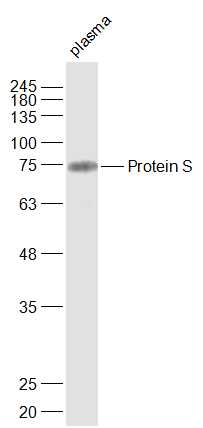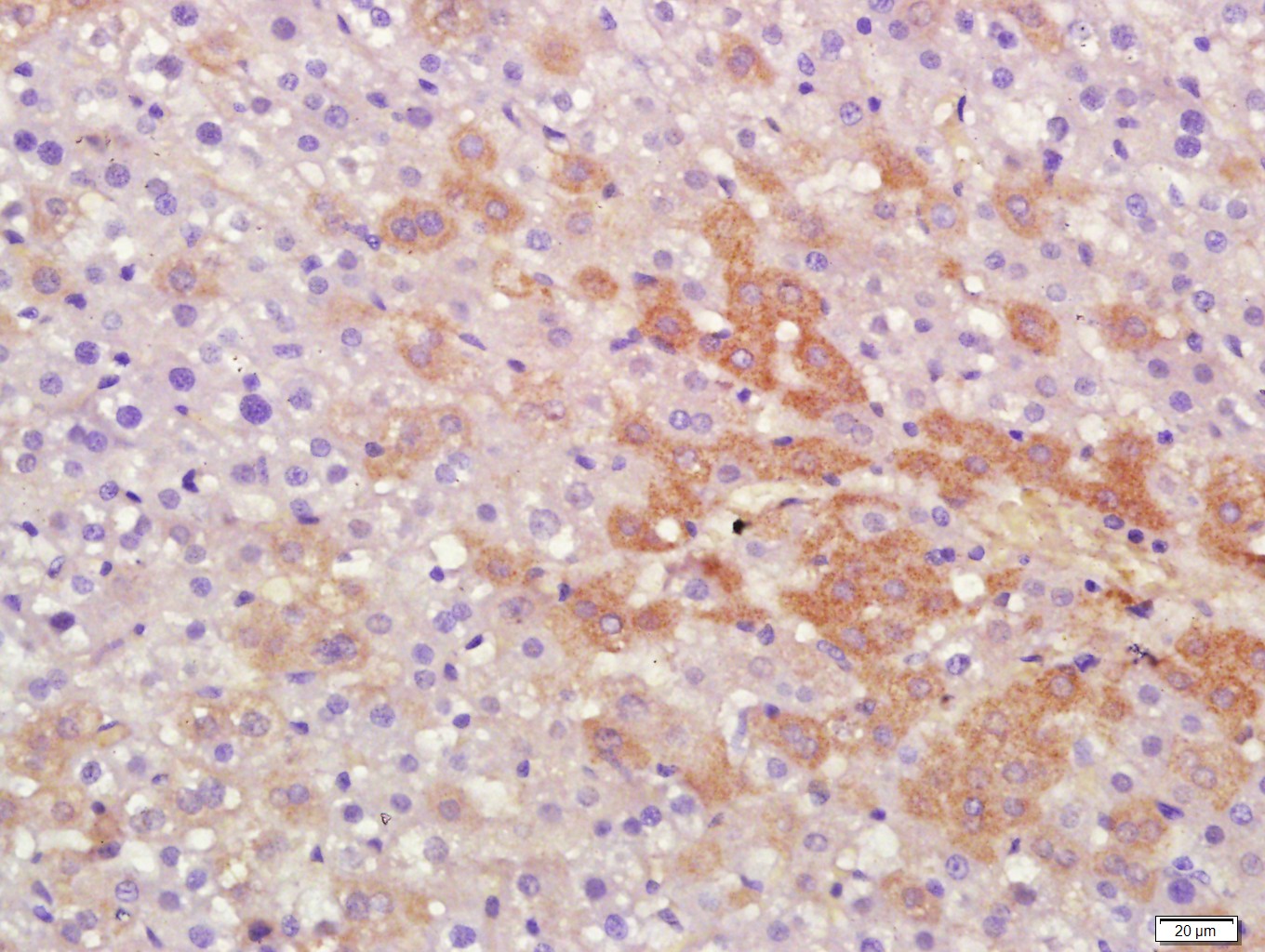
Rabbit Anti-Protein S antibody
Preproprotein S; Propiece of latent protein S; PROS 1; PROS; PROS_HUMAN; PROS1; Protein S alpha; Protein Sa; PS 21; PS 22; PS 23; PS 24; PS 25; PS 26; PS21; PS22; PS23; PS24; PS25; PS26; PSA; Vitamin K dependent protein S; Vitamin K-dependent protein S.
View History [Clear]
Details
Product Name Protein S Chinese Name 蛋白S抗体 Alias Preproprotein S; Propiece of latent protein S; PROS 1; PROS; PROS_HUMAN; PROS1; Protein S alpha; Protein Sa; PS 21; PS 22; PS 23; PS 24; PS 25; PS 26; PS21; PS22; PS23; PS24; PS25; PS26; PSA; Vitamin K dependent protein S; Vitamin K-dependent protein S. Research Area Cardiovascular Cell biology immunology Immunogen Species Rabbit Clonality Polyclonal React Species Mouse, Rat, (predicted: Human, Cow, Horse, Sheep, ) Applications WB=1:500-2000 ELISA=1:5000-10000 IHC-P=1:100-500 IHC-F=1:100-500 IF=1:50-200 (Paraffin sections need antigen repair)
not yet tested in other applications.
optimal dilutions/concentrations should be determined by the end user.Theoretical molecular weight 71kDa Cellular localization Secretory protein Form Liquid Concentration 1mg/ml immunogen KLH conjugated synthetic peptide derived from human Protein S/PROS: 221-320/676 Lsotype IgG Purification affinity purified by Protein A Buffer Solution 0.01M TBS(pH7.4) with 1% BSA, 0.03% Proclin300 and 50% Glycerol. Storage Shipped at 4℃. Store at -20 °C for one year. Avoid repeated freeze/thaw cycles. Attention This product as supplied is intended for research use only, not for use in human, therapeutic or diagnostic applications. PubMed PubMed Product Detail Protein S (PROS) is a vitamin K-dependent plasma protein that inhibits blood clotting by serving as a cofactor for activated protein C (APC) and facilitates clearance of early apoptotic cells. In the plasma, circulating Protein S becomes inactive upon complexing with C4b-binding protein (C4BP); 60-70% of Protein S circulates in complex with C4BP. Calcium-dependent association of C4BP-Protein S with apoptotic cells influences the regulation of complement activation. Protein S has APC-independent anticoagulant activity through direct inhibition of prothrombin activation via interactions with Factor X A, Factor V A and phospholipids. Autosomal dominant Protein S deficiency (levels 15 to 37% of normal) correlates with severe recurrent venous thrombosis.
Function:
Anticoagulant plasma protein; it is a cofactor to activated protein C in the degradation of coagulation factors Va and VIIIa. It helps to prevent coagulation and stimulating fibrinolysis.
Subcellular Location:
Secreted
Tissue Specificity:
Plasma.
Post-translational modifications:
The iron and 2-oxoglutarate dependent 3-hydroxylation of aspartate and asparagine is (R) stereospecific within EGF domains (By similarity).
DISEASE:
Defects in PROS1 are the cause of thrombophilia due to protein S deficiency, autosomal dominant (THPH5) [MIM:612336]. A hemostatic disorder characterized by impaired regulation of blood coagulation and a tendency to recurrent venous thrombosis. However, many adults with heterozygous disease may be asymptomatic. Based on the plasma levels of total and free PROS1 antigen as well as the serine protease-activated protein C cofactor activity, three types of PROS1D have been described: type I, characterized by reduced total and free PROS1 antigen levels together with reduced anticoagulant activity; type III, in which only free PROS1 antigen and PROS1 activity levels are reduced; and the rare type II which is characterized by normal concentrations of both total and free PROS1 antigen, but low cofactor activity.
Defects in PROS1 are the cause of thrombophilia due to protein S deficiency, autosomal recessive (THPH6) [MIM:614514]. A very rare and severe hematologic disorder resulting in thrombosis and secondary hemorrhage usually beginning in early infancy. Some affected individuals develop neonatal purpura fulminans, multifocal thrombosis, or intracranial hemorrhage.
Similarity:
Contains 4 EGF-like domains.
Contains 1 Gla (gamma-carboxy-glutamate) domain.
Contains 2 laminin G-like domains.
SWISS:
P07225
Gene ID:
5627
Database links:Entrez Gene: 5627 Human
Omim: 176880 Human
SwissProt: P07225 Human
Unigene: 64016 Human
Product Picture
Plasma (Mouse) Lysate at 40 ug
Primary: Anti-Protein S (SL9512R) at 1/1000 dilution
Secondary: IRDye800CW Goat Anti-Rabbit IgG at 1/20000 dilution
Predicted band size: 71 kD
Observed band size: 75 kD
Paraformaldehyde-fixed, paraffin embedded (Rat liver); Antigen retrieval by boiling in sodium citrate buffer (pH6.0) for 15min; Block endogenous peroxidase by 3% hydrogen peroxide for 20 minutes; Blocking buffer (normal goat serum) at 37°C for 30min; Antibody incubation with (Protein S) Polyclonal Antibody, Unconjugated (SL9512R) at 1:400 overnight at 4°C, followed by a conjugated secondary (sp-0023) for 20 minutes and DAB staining.
References (0)
No References
Bought notes(bought amounts latest0)
No one bought this product
User Comment(Total0User Comment Num)
- No comment




 +86 571 56623320
+86 571 56623320
 +86 18668110335
+86 18668110335

